2018年工商银行秋季招聘试卷
题目总数:142
总分数:142
时间:不限时
第 1 题
单选题
在“一带一路”国际合作高峰论坛上,各国专家聆听中华人民共和国主席习近平在开幕式上发表的主旨演讲。演讲内容如下:
尊敬的各位国家元首,政府首脑,各位部长,各位国际组织负责人,女士们,先生们,朋友们:
“孟夏之日,万物并秀。”在这美好时节,来自100多个国家的各界嘉宾齐聚北京,共商“一带一路”建设合作大计,具有十分重要的意义。今天,________,少长咸集,我期待着大家集思广益、畅所欲言,为推动“一带一路”建设献计献策,让这一世纪工程造福各国人民。
请你在发言稿中空缺的地方,选择恰当的词语。( )
尊敬的各位国家元首,政府首脑,各位部长,各位国际组织负责人,女士们,先生们,朋友们:
“孟夏之日,万物并秀。”在这美好时节,来自100多个国家的各界嘉宾齐聚北京,共商“一带一路”建设合作大计,具有十分重要的意义。今天,________,少长咸集,我期待着大家集思广益、畅所欲言,为推动“一带一路”建设献计献策,让这一世纪工程造福各国人民。
请你在发言稿中空缺的地方,选择恰当的词语。( )
A.
群贤毕至
B.
钟灵毓秀
C.
人杰地灵
D.
群英荟萃
E.
群星荟萃
F.
群雄毕聚
第 2 题
单选题
下面4句话,排列顺序不是很正确,请你按正确的顺序排列。
(1)2000多年前,我们的先辈筚路蓝缕,穿越草原沙漠,开辟出联通亚欧非的陆上丝绸之路
(2)古丝绸之路打开了各国友好交流的新窗口,书写了人类发展进步的新篇章
(3)中国陕西历史博物馆珍藏的千年“鎏金铜蚕”,在印度尼西亚发现的千年沉船“黑石号”等,见证了这段历史
(4)我们的先辈扬帆远航,穿越惊涛骇浪,闯荡出连接东西方的海上丝绸之路
(1)2000多年前,我们的先辈筚路蓝缕,穿越草原沙漠,开辟出联通亚欧非的陆上丝绸之路
(2)古丝绸之路打开了各国友好交流的新窗口,书写了人类发展进步的新篇章
(3)中国陕西历史博物馆珍藏的千年“鎏金铜蚕”,在印度尼西亚发现的千年沉船“黑石号”等,见证了这段历史
(4)我们的先辈扬帆远航,穿越惊涛骇浪,闯荡出连接东西方的海上丝绸之路
A.
(1)(4)(2)(3)
B.
(1)(4)(3)(2)
C.
(4)(1)(2)(3)
D.
(4)(1)(3)(2)
第 3 题
单选题
上一题的演讲材料中的“筚路蓝缕”是什么意思呢?( )
A.
是指我们的先辈不断经历风雨,经历坎坷的道路,形容旅途环境非常艰苦
B.
是指我们的先辈风餐露宿,衣着破烂,形容生活非常艰辛
C.
是指我们的先辈驾着简陋的柴车,穿着破烂的衣服去开辟山林道路,形容创业的艰苦
D.
是指我们的先辈靠着双腿,走出一条丝绸之路,进行了艰辛和顽强的拼搏
第 4 题
单选题
古丝绸之路绵亘万里,延续千年,积淀了以和平合作、开放包容、互学互鉴、互利共赢为核心的丝路精神。这是人类文明的宝贵遗产。
——和平合作。(1)从公元前140多年的中国汉代,一支从长安出发的和平使团,开始打通东方通往西方的道路,完成了“凿空之旅”,这就是著名的张骞出使西域。(2)中国唐宋元时期,陆上和海上丝绸之路同步发展,中国、意大利、摩洛哥的旅行家杜环、马可·波罗、伊本·白图泰都在陆上和海上丝绸之路留下了历史印记。(3)15世纪初的明代,留下千古佳话,中国著名航海家郑和七次远洋航海。(4)这些开拓事业之所以永垂不朽,是因为使用的不是战马和长矛,而是驼队和善意;依靠的不是坚船和利炮,而是宝船和友谊。
一代又一代“丝路人”架起了东西方合作的纽带、和平的桥梁。
请选出没有语病的一句是( )。
——和平合作。(1)从公元前140多年的中国汉代,一支从长安出发的和平使团,开始打通东方通往西方的道路,完成了“凿空之旅”,这就是著名的张骞出使西域。(2)中国唐宋元时期,陆上和海上丝绸之路同步发展,中国、意大利、摩洛哥的旅行家杜环、马可·波罗、伊本·白图泰都在陆上和海上丝绸之路留下了历史印记。(3)15世纪初的明代,留下千古佳话,中国著名航海家郑和七次远洋航海。(4)这些开拓事业之所以永垂不朽,是因为使用的不是战马和长矛,而是驼队和善意;依靠的不是坚船和利炮,而是宝船和友谊。
一代又一代“丝路人”架起了东西方合作的纽带、和平的桥梁。
请选出没有语病的一句是( )。
A.
第(2)句
B.
第(3)句
C.
第(1)句
D.
第(4)句
第 5 题
单选题
——开放包容。古丝绸之路跨越尼罗河流域、底格里斯河和幼发拉底河流域、印度河和恒河流域、黄河和长江流域,跨越埃及文明、巴比伦文明、印度文明、中华文明的发祥地,跨越佛教、基督教、伊斯兰教信众的汇集地,跨越不同国度和肤色人民的聚居地。不同文明、宗教、种族求同存异、开放包容,并肩书写相互尊重的壮丽诗篇,携手绘就共同发展的美好画卷。酒泉、敦煌、吐鲁番、撒马尔罕、巴格达、君士坦丁堡等古城,宁波、泉州、广州、北海、科伦坡、吉达、亚历山大等地的古港,就是记载这段历史的“活化石”。
用哪一句话作为上面这段文字的总结句最好呢?( )
用哪一句话作为上面这段文字的总结句最好呢?( )
A.
历史教导我们,不同的文明、宗教、种族之间,都是开放包容的
B.
展望未来,只有开放包容,才能复兴四大文明
C.
经验告诉我们:丝绸之路是一条开放之路
D.
历史告诉我们:文明在开放中发展,民族在融合中共存
第 6 题
单选题
——互学互鉴。古丝绸之路不仅是一条通商易货之道,更是一条知识交流之路。沿着古丝绸之路,中国将丝绸、瓷器、漆器、铁器传到西方,也为中国带来了胡椒、亚麻、香料、葡萄、石榴。沿着古丝绸之路,佛教、伊斯兰教及阿拉伯的天文、历法、医药传入中国,中国的四大发明、养蚕技术也由此传向世界。(接下来的4句话应该怎么排序?)
(1)比如,佛教源于印度,在中国发扬光大,在东南亚得到传承
(2)更为重要的是,商品和知识交流带来了观念创新
(3)儒家文化起源中国,受到欧洲莱布尼茨、伏尔泰等思想家的推崇
(4)这就是交流的魅力、互鉴的成果
(1)比如,佛教源于印度,在中国发扬光大,在东南亚得到传承
(2)更为重要的是,商品和知识交流带来了观念创新
(3)儒家文化起源中国,受到欧洲莱布尼茨、伏尔泰等思想家的推崇
(4)这就是交流的魅力、互鉴的成果
A.
(2)(1)(3)(4)
B.
(2)(1)(4)(3)
C.
(1)(2)(4)(3)
D.
(1)(2)(3)(4)
第 7 题
单选题
——互利共赢。(1)古丝绸之路见证了陆上“使者相望于道,商旅不绝于途”的盛况,也见证了海上“舶交海中,不知其数”的繁华。(2)在这条大动脉上,资金、技术、人员等生产要素,商品、资源、成果等实现共享。(3)阿拉木图、撒马尔罕、长安等重镇和苏尔港、广州等良港兴旺发达,罗马、安息、贵霜等古国欣欣向荣,中国汉唐迎来盛世。(4)古丝绸之路创造了地区大发展大繁荣。
其中有一句话有一些语病,请你找出来吧。( )
其中有一句话有一些语病,请你找出来吧。( )
A.
第(3)句
B.
第(2)句
C.
第(4)句
D.
第(1)句
第 8 题
单选题
历史是最好的老师。对以上(2—7题)讲话内容,最精确的总结是( )。
A.
丝绸之路在古代是一条横贯亚洲、连接欧亚大陆的著名陆上商贸通道
B.
丝绸之路作为起始于古代中国,连接亚洲、非洲和欧洲的商业贸易路线,曾经对东西方经济、文化、社会发展产生过重大作用和影响
C.
这段历史表明,无论相隔多远,只要我们勇敢迈出第一步,坚持相向而行,就能走出一条相遇相知、共同发展之路,走向幸福安宁和谐美好的远方
D.
丝绸之路的开辟,有力地促进了东西方的经济文化交流,对促成汉朝的兴盛产生了积极的作用,这条丝绸之路至今仍是中西交往的一条重要道路
第 9 题
单选题
(1)世界经济增长需要新动力,发展需要更加普惠平衡,贫富差距鸿沟有待弥合
(2)各国之间的联系从来没有像今天这样紧密,世界人民对美好生活的向往从来没有像今天这样强烈,人类战胜困难的手段从来没有像今天这样丰富
(3)世界多极化、经济全球化、社会信息化、文化多样化深入发展,和平发展的大势日益强劲,变革创新的步伐持续向前
(4)和平赤字、发展赤字、治理赤字,是摆在全人类面前的严峻挑战。这是我一直思考的问题
(5)地区热点持续动荡,恐怖主义蔓延肆虐
(6)从历史维度看,人类社会正处在一个大发展大变革大调整时代
(7)从现实维度看,我们正处在一个挑战频发的世界
以上这段文字,语序有些错乱,请你按正确的顺序重新排列。
(2)各国之间的联系从来没有像今天这样紧密,世界人民对美好生活的向往从来没有像今天这样强烈,人类战胜困难的手段从来没有像今天这样丰富
(3)世界多极化、经济全球化、社会信息化、文化多样化深入发展,和平发展的大势日益强劲,变革创新的步伐持续向前
(4)和平赤字、发展赤字、治理赤字,是摆在全人类面前的严峻挑战。这是我一直思考的问题
(5)地区热点持续动荡,恐怖主义蔓延肆虐
(6)从历史维度看,人类社会正处在一个大发展大变革大调整时代
(7)从现实维度看,我们正处在一个挑战频发的世界
以上这段文字,语序有些错乱,请你按正确的顺序重新排列。
A.
(6)(3)(2)(7)(1)(5)(4)
B.
(6)(2)(3)(7)(1)(4)(5)
C.
(6)(3)(2)(7)(1)(4)(5)
D.
(6)(2)(3)(7)(1)(5)(4)
第 10 题
多选题
2013年秋天,我在哈萨克斯坦和印度尼西亚提出共建丝绸之路经济带和21世纪海上丝绸之路,即“一带一路”倡议。“桃李不言,下自成蹊。”4年来,全球100多个国家和国际组织积极支持和参与“一带一路”建设,联合国大会、联合国安理会等重要决议也纳入“一带一路”建设内容。“一带一路”建设逐渐从理念转化为行动,从愿景转变为现实,建设成果丰硕。
对上面这段文字中,“桃李不言,下自成蹊”的理解,正确的是( )。
对上面这段文字中,“桃李不言,下自成蹊”的理解,正确的是( )。
A.
行在言先,中国人本是重视“实践”和“实效”的民族,不尚空谈和清谈
B.
“一带一路”倡议具有很大的感召力
C.
当代中国无疑正是“桃李”一般的嘉木,得到了众多国家和国际组织的积极支持
D.
“一带一路”倡议充分体现了当代中国的“道路自信”
第 11 题
单选题
——这是政策沟通不断深化的4年。我多次说过,“一带一路”建设不是另起炉灶、推倒重来,而是实现战略对接、优势互补。我们同有关国家协调政策,包括俄罗斯提出的欧亚经济联盟、东盟提出的互联互通总体规划、哈萨克斯坦提出的“光明之路”、土耳其提出的“中间走廊”、蒙古提出的“发展之路”、越南提出的“两廊一圈”、英国提出的“英格兰北方经济中心”、波兰提出的“琥珀之路”等。中国同老挝、柬埔寨、缅甸、匈牙利等国的规划对接工作也全面展开。中国同40多个国家和国际组织签署了合作协议,同30多个国家开展机制化产能合作。本次论坛期间,我们还将签署一批对接合作协议和行动计划,同60多个国家和国际组织共同发出推进“一带一路”贸易畅通合作倡议。
这段文字的主旨是什么?( )
这段文字的主旨是什么?( )
A.
“一带一路”可以完全替代各地区的经济计划
B.
“一带一路”与各地区的经济政策存在一定的冲突
C.
“一带一路”与其他区域经济政策对接,存在一定的难度
D.
各方通过政策对接,实现了“一加一大于二”的效果
第 12 题
单选题
——这是贸易畅通不断攀升的4年。
(1)同“一带一路”参与国大力推动贸易和投资便利化,不断改善营商环境。(2)我了解到,仅哈萨克斯坦等中亚国家农产品到达中国市场的通关时间就缩短了90%。(3)2014年至2016年,中国为“一带一路”沿线国家贸易总额超过3万亿美元。中国为“一带一路”沿线国家投资累计超过500亿美元。(4)中国企业已经在20多个国家建设56个经贸合作区,为有关国家制造近11亿美元税收和18万个就业岗位。
这段文字中,有一些句子有语病,请选出没有语病的一句话。( )
(1)同“一带一路”参与国大力推动贸易和投资便利化,不断改善营商环境。(2)我了解到,仅哈萨克斯坦等中亚国家农产品到达中国市场的通关时间就缩短了90%。(3)2014年至2016年,中国为“一带一路”沿线国家贸易总额超过3万亿美元。中国为“一带一路”沿线国家投资累计超过500亿美元。(4)中国企业已经在20多个国家建设56个经贸合作区,为有关国家制造近11亿美元税收和18万个就业岗位。
这段文字中,有一些句子有语病,请选出没有语病的一句话。( )
A.
第(3)句
B.
第(2)句
C.
第(4)句
D.
第(1)句
第 13 题
单选题
——这是资金融通不断扩大的4年。融资瓶颈是实现互联互通的突出挑战。中国同“一带一路”建设参与国和组织开展了多种形式的金融合作。亚洲基础设施投资银行已经为“一带一路”建设参与国的9个项目提供17亿美元贷款,“丝路基金”投资达40亿美元。中国同中东欧“16+1”金融控股公司正式成立。这些新型金融机制同世界银行等传统多边金融机构各有侧重、互为补充,形成层次清晰、初具规模的“一带一路”金融合作网络。
——这是民心相通不断促进的4年。“国之交在于民相亲,民相亲在于心相通。”“一带一路”建设参与国弘扬丝绸之路精神,开展智力丝绸之路、健康丝绸之路等建设,在科学、教育、文化、卫生、民间交往等各领域广泛开展合作,为“一带一路”建设夯实民意基础,筑牢社会根基。中国政府每年向相关国家提供1万个政府奖学金名额,地方政府也设立了丝绸之路专项奖学金,鼓励国际文教交流。各类丝绸之路文化年、旅游年、艺术节、影视桥、研讨会、智库对话等人文合作项目百花纷呈,人们往来频繁,在交流中拉近了心与心的距离。
“一带一路”的丰硕成果表明了什么呢?( )
——这是民心相通不断促进的4年。“国之交在于民相亲,民相亲在于心相通。”“一带一路”建设参与国弘扬丝绸之路精神,开展智力丝绸之路、健康丝绸之路等建设,在科学、教育、文化、卫生、民间交往等各领域广泛开展合作,为“一带一路”建设夯实民意基础,筑牢社会根基。中国政府每年向相关国家提供1万个政府奖学金名额,地方政府也设立了丝绸之路专项奖学金,鼓励国际文教交流。各类丝绸之路文化年、旅游年、艺术节、影视桥、研讨会、智库对话等人文合作项目百花纷呈,人们往来频繁,在交流中拉近了心与心的距离。
“一带一路”的丰硕成果表明了什么呢?( )
A.
“一带一路”带来的收获远远大于弊端
B.
“一带一路”已经取得了最终的成功,各国人民已经获得了巨大的利益
C.
“一带一路”倡议顺应时代潮流,适应发展规律,符合各国人民利益,具有广阔前景
D.
“一带一路”使所有国家都受益匪浅
第 14 题
单选题
第一,我们要将“一带一路”建成和平之路。古丝绸之路,和时兴,战时衰。“一带一路”建设离不开和平安宁的环境,我们要构建以合作共赢为核心的新型国际关系,打造对话不对抗、结伴不结盟的伙伴关系。各国应该尊重彼此主权、尊严、领土完整,尊重彼此发展道路和社会制度,尊重彼此核心利益和重大关切。
(1)要着力斡旋调解,坚持公道正义;要着力推进反恐,标本兼治,消除贫困落后和社会不公
(2)我们要建立共同、综合、合作、可持续的安全观,营造共建共享的安全格局。要着力化解热点,坚持政治解决
(3)这种状况不能再持续下去
(4)古丝绸之路沿线地区曾经是“流淌着牛奶与蜂蜜的地方”,如今很多地方却成了冲突动荡和危机挑战的代名词
以上4句话,最恰当的语序是什么呢?( )
(1)要着力斡旋调解,坚持公道正义;要着力推进反恐,标本兼治,消除贫困落后和社会不公
(2)我们要建立共同、综合、合作、可持续的安全观,营造共建共享的安全格局。要着力化解热点,坚持政治解决
(3)这种状况不能再持续下去
(4)古丝绸之路沿线地区曾经是“流淌着牛奶与蜂蜜的地方”,如今很多地方却成了冲突动荡和危机挑战的代名词
以上4句话,最恰当的语序是什么呢?( )
A.
(1)(2)(3)(4)
B.
(4)(2)(3)(1)
C.
(4)(3)(2)(1)
D.
(1)(2)(4)(3)
第 15 题
单选题
(1)第二,我们要将“一带一路”建成繁荣之路。(2)发展是解决一切问题的总钥匙。(3)推进“一带一路”建设,要聚焦发展这个根本性问题,释放各国发展潜力,实现经济大融合、发展大联动、成果大共享。(4)产业是经济之本,我们要深入开展产业合作,推动各国产业发展规划相互兼容、相互促进,抓好大项目建设,加强国际产能和装备制造合作,抓住新工业革命的发展新机遇,培育新业态,保持经济增长活力。
以下哪个选项是正确的呢?( )
以下哪个选项是正确的呢?( )
A.
第(1)句有语病
B.
第(2)句有语病
C.
第(3)句有语病
D.
第(4)句有语病
E.
全部没有语病
第 16 题
单选题
第三,我们要将“一带一路”建成开放之路。开放带来进步,封闭导致落后。
(1)我们欢迎各国结合自身国情,积极发展开放型经济,参与全球治理和公共产品供给,携手构建广泛的利益共同体
(2)对一个国家而言,开放如同( ),虽会经历一时阵痛,但将带来新生
(3)我们要打造开放型合作平台,维护和发展开放型世界经济,共同创造有利于开放发展的环境,推动构建公正、合理、透明的国际经贸投资规则体系,促进生产要素有序流动、资源高效配置、市场深度融合
(4)“一带一路”建设要以开放为导向,解决经济增长和平衡问题
这段文章中,带序号的四句话的排序正确吗?( )
(1)我们欢迎各国结合自身国情,积极发展开放型经济,参与全球治理和公共产品供给,携手构建广泛的利益共同体
(2)对一个国家而言,开放如同( ),虽会经历一时阵痛,但将带来新生
(3)我们要打造开放型合作平台,维护和发展开放型世界经济,共同创造有利于开放发展的环境,推动构建公正、合理、透明的国际经贸投资规则体系,促进生产要素有序流动、资源高效配置、市场深度融合
(4)“一带一路”建设要以开放为导向,解决经济增长和平衡问题
这段文章中,带序号的四句话的排序正确吗?( )
A.
正确
B.
错误
第 17 题
单选题
第三,我们要将“一带一路”建成开放之路。开放带来进步,封闭导致落后。
(1)我们欢迎各国结合自身国情,积极发展开放型经济,参与全球治理和公共产品供给,携手构建广泛的利益共同体
(2)对一个国家而言,开放如同( ),虽会经历一时阵痛,但将带来新生
(3)我们要打造开放型合作平台,维护和发展开放型世界经济,共同创造有利于开放发展的环境,推动构建公正、合理、透明的国际经贸投资规则体系,促进生产要素有序流动、资源高效配置、市场深度融合
(4)“一带一路”建设要以开放为导向,解决经济增长和平衡问题
请为上一题文中括号处选出一个最适当的词语。( )
A.
破茧成蝶
B.
浴火重生
C.
绝地重生
D.
凤凰涅槃
E.
雏鹰展翅
第 18 题
单选题
下面几句话,排列顺序不是很正确,请你按照正确的顺序排列。
(1)我们要有向外看的胸怀,维护多边贸易体制
(2)贸易是经济增长的重要引擎
(3)建设开放、包容、普惠、平衡、共赢的经济全球化
(4)推动自由贸易区建设,促进贸易和投资自由化便利化
(5)当然,我们也要着力解决发展失衡、治理困境、数字鸿沟、分配差距等问题
(1)我们要有向外看的胸怀,维护多边贸易体制
(2)贸易是经济增长的重要引擎
(3)建设开放、包容、普惠、平衡、共赢的经济全球化
(4)推动自由贸易区建设,促进贸易和投资自由化便利化
(5)当然,我们也要着力解决发展失衡、治理困境、数字鸿沟、分配差距等问题
A.
(2)(1)(4)(5)(3)
B.
(2)(1)(3)(4)(5)
C.
(1)(2)(4)(5)(3)
D.
(1)(2)(3)(4)(5)
第 19 题
单选题
第四,我们要将“一带一路”建成创新之路。创新是推动发展的重要力量。“一带一路”建设本身就是一个创举,搞好“一带一路”建设也要向创新要动力。我们要坚持创新驱动发展,加强在数字经济、人工智能、纳米技术、量子计算机等前沿领域合作,推动大数据、云计算、智慧城市建设,连接成21世纪的数字丝绸之路。我们要促进科技同产业、科技同金融深度融合,优化创新环境,集聚创新资源。我们要为互联网时代的各国青年打造创业空间、创业工厂,成就未来一代的青春梦想。
用哪一句话作为上面一段文字的总结句最好呢?( )
用哪一句话作为上面一段文字的总结句最好呢?( )
A.
创新之路关键是要依靠制度创新、组织创新、政策创新和文化创新
B.
创新就是以市场换技术,全面打开市场才能换取创新之路
C.
创新之路,将开启“一带一路”沿线国家合作、共赢的新航程
D.
创新就是创业,创新之路就是创业之路,我们要大力鼓励“大众创业、万众创业”
第 20 题
单选题
女士们、先生们、朋友们!(1)中国古语讲:“不积跬步,无以至千里。”阿拉伯谚语说,“金字塔是一块块石头垒成的”。(2)欧洲也有句话:“伟业非一日之功”。(3)“一带一路”建设事业是重要的阵地,还需要伟大的实践。(4)让我们一步一个脚印推进实施,一点一滴抓出成果,造福世界,造福人民!
这段文字中,哪句话是有语病的?( )
这段文字中,哪句话是有语病的?( )
A.
第(1)句
B.
第(2)句
C.
第(3)句
D.
第(4)句
第 21 题
单选题
论坛结束后,南亚各国的学者和代表与你进行了沟通和交流,交流内容涉及到方方面面,有文化、前沿科技、当前热点等。请你为他们解答如下问题:
以下哪个是儒家的道德标准?( )
以下哪个是儒家的道德标准?( )
A.
无为
B.
中庸
C.
非攻
D.
逍遥
第 22 题
单选题
目前________汽车依靠人工智能、视觉计算、雷达、监控装置和全球定位系统协同合作,让电脑可以在没有任何人类主动的操作下,自动安全地操作机动车辆。2010年谷歌宣布正在研发此技术,这波浪潮开始涌动,奔驰、宝马、特斯拉,还有百度、华为、苹果等各大公司、车企也纷纷投身其中,掀起了技术变革的热潮。
A.
自动驾驶汽车
第 23 题
单选题
当人们还在关注AlphaCo的时候,AlphaCo已不再是地球上最好的棋手。新式高超的人工智能机器人( )已经出现,它从零开始,仅仅通过自学使自己的游戏技能得以提高。在一场白热化对决中,它以100:0的不败战绩绝杀“前辈”。在每场对弈结束后,它实际上都训练了一个新的神经网络。
A.
Ponanza
B.
Deepmind
C.
Alpha Zero
D.
AlphaGo Zero
第 24 题
单选题
太阳能是太阳内部连续不断的( )过程产生的能量。
A.
核裂变反应
B.
核辐射反应
C.
核衰变反应
D.
核聚变反应
第 25 题
单选题
量子卫星是中国科学院空间科学先导专项首批科学实验卫星之一,其主要科学目标是借助卫星平台,进行星地高速量子密钥分发实验,以期在( )实用化方面取得重大突破。
A.
空间量子通信
B.
高速量子计算
C.
爱因斯坦质能方程
D.
空间量子力学
第 26 题
单选题
图灵测试的标准是当超过( )的测试者不能确定被测试者是人还是机器,那么这台机器就通过了测试,并被认为具有人类智能。
A.
40%
B.
30%
C.
50%
D.
60%
第 27 题
多选题
人脸识别计算是指利用分析比较的计算机技术识别人脸。人脸识别是一项热门的计算机技术研究领域,其中包括人脸追踪侦测,自动调整影像放大,夜间红外侦测,自动调整曝光强度等技术。以下哪些选项使用了人脸识别技术?( )
第 28 题
单选题
纳米技术是利用电子的( )进行工作的。
A.
分解性
B.
波动性
C.
粒子性
D.
变异性
第 29 题
单选题
计算机管理系统的本质是( )。
A.
数据仓库系统
B.
大型网络系统
C.
人机管理系统
D.
人工智能系统
第 30 题
单选题
“云安全(CloudSecurity)”计划是网络时代信息安全的最新体现,它融合了一些新兴技术和概念,但一般不包括( )。
A.
包过滤防火墙
B.
并行处理
C.
未知病毒行为判断
D.
网络计算
第 31 题
单选题
论坛在热烈的气氛中结束了,会后需要和南亚的媒体进行合作,通过传媒的方式介绍中国及全球的时事热点,让南亚民众更加了解中国以及全球的形势。
8月1日,庆祝中国人民解放军建军( )周年大会在北京人民大会堂隆重举行,中共中央,国家主席,中央军委主席习近平在大会上发表重要讲话。
8月1日,庆祝中国人民解放军建军( )周年大会在北京人民大会堂隆重举行,中共中央,国家主席,中央军委主席习近平在大会上发表重要讲话。
A.
95
B.
90
C.
100
D.
85
第 32 题
多选题
十八大以来,在中国举办的大型国际会议有( )。
第 33 题
单选题
10月16日,多国科学家联合宣布,人类第一次直接探测到来自双中子星合并的( )。
A.
暗物质
B.
引力波
C.
希格斯场
D.
暗能量
第 34 题
单选题
( )是一种可以创建和体验虚拟世界的计算机仿真系统,它利用计算机生成一种模拟环境,是一种多源信息融合的、交互式的三维动态视景和实体行为的系统仿真,使用户沉浸到该环境中。
A.
虚拟现实技术VR
B.
影像现实CR
C.
增强现实技术AR
D.
混合虚拟技术MR
第 35 题
单选题
2016年,中国工商银行连续第4年蝉联《银行家》全球1000家大银行,美国《福布斯》全球企业2000强和美国《财富》“500强商业银行子榜单”3个权威排行榜的( )。
A.
第二名
B.
第三名
C.
第一名
D.
第四名
第 36 题
单选题
2017年10月24日上午,党的十九大通过了关于《中国共产党章程(修正案)》的决议。大会一致同意,在党章中把习近平( )同马克思列宁主义、毛泽东思想、邓小平理论、“三个代表”重要思想、科学发展观一道确立为党的行动指南。
A.
中国特色社会主义思想
B.
百年中国特色社会主义
C.
现代化中国特色社会主义
D.
新时代中国特色社会主义
第 37 题
单选题
9月29日,中国在西昌卫星发射中心,成功将( )卫星发射升空。此卫星将主要用于科学试验、国土资源普查、农作物估产及防灾减灾等领域。
A.
实践十三号
B.
墨子号量子
C.
风云四号
D.
遥感三十号
第 38 题
单选题
2017年9月21日,美联储正式宣布从今年10月开始启动渐进式缩表。所谓缩表,即缩减( )。
A.
主要资产表
B.
主要负债表
C.
资产负债表
D.
资产收益表
第 39 题
单选题
( )是具有中国自主知识产权、世界最大单口径、最灵敏的射电望远镜。10月10日,其探测到的星体达数十个。其中目前已通过系统认证的达6颗。
A.
天空之眼
B.
中国天眼(FAST)
C.
TMT
D.
巨型麦哲伦望眼镜
第 40 题
单选题
新华社北京10月12日电,经中央军委批准,中央军委办公厅日前印发( )。这是新形势下发挥军队资源优势推动全民国防教育普及深入的重要举措。
A.
《中国人民解放军军营开放办法》
B.
《中国共产党军队委员会工作条例》
C.
《关于加快推进建设现代营房的意见》
D.
《我军军事职业教育改革部署展开》
第 41 题
多选题
特朗普当选美国总统后,美国都退出了以下哪些组织和协议( )?
第 42 题
单选题
10月18日,中国共产党第十九次全国代表大会,习近平总书记代表十八届中央委员会向大会作报告,报告中指出,我国社会主要矛盾已经转化为( )。
A.
人民日益增长的物质文化需要同落后的社会生产之间的矛盾
B.
人民日益增长的美好生活需要和不平衡不充分的发展之间的矛盾
C.
生产关系和生产力、上层建筑和经济基础基本适应条件下的矛盾
D.
经济基础和上层建筑的矛盾
第 43 题
单选题
( )是超大型跨海通道,全长55公里,建成后将成为世界最长的跨海大桥。预计2017年年底或2018年建成通车。
A.
港珠澳大桥
B.
港深澳大桥
C.
厦漳跨海大桥
D.
杭州湾跨海大桥
第 44 题
单选题
( )载人潜水器是一艘由中国自行设计,自主集成研制的载人潜水器,也是863计划中的一个重大计划,当前最大下潜深度7062.68米,理论上它的工作范围可覆盖全球99.8%海洋区域。
A.
蛟龙号
B.
彩虹鱼号
C.
远征号
D.
长征号
第 45 题
单选题
博览会开幕这天,你早早的来到博览会门口,你看了一下门口的大时钟,时间正好是10:00。你突然想到个有趣的问题,从现在开始,过( )分钟后,时针和分针重合?
A.
60
B.
54
C.
49
D.
37
第 46 题
单选题
你来到博览会入口,看到8名教师带着40名小学生前来参观。博览会售票规定如下图:

请你帮他们计算一下,全部人都要进入景点,那么花费最少是( )元。

请你帮他们计算一下,全部人都要进入景点,那么花费最少是( )元。
A.
336
B.
308
C.
280
D.
260
第 47 题
单选题
进入博览会后,你看到一家西亚的参展商,正在搭建自己的站台,原材料铁条和实际需求如下:

请你帮他们计算一下,为了节省材料,至少需要( )根10米的原材料铁条。

请你帮他们计算一下,为了节省材料,至少需要( )根10米的原材料铁条。
A.
100
B.
75
C.
200
D.
50
第 48 题
单选题
截取完铁条后,这家参展商需要圈一块展台场地,他们将一根长56米的绳子截成4段,首尾相接拼成一个四边形作为展台基地,该四边形的最大面积是( )平方米。
A.
192
B.
195
C.
196
D.
225
第 49 题
单选题
往前走,你来到瓷器展区。西亚人民非常喜欢中国精美的瓷器。中国瓷器在西亚非常畅销。本次展会上,西亚的甲乙两家瓷器进口商,一共从中国进口了单色釉瓷和彩绘瓷共160件。目前两家的瓷器都混在了一起。已知的信息如下:甲进口商的瓷器中有17%是单色釉瓷;乙进口商的瓷器中有20%是单色釉瓷。
请你帮他们计算一下,乙进口商进口的彩绘瓷共有( )件。
请你帮他们计算一下,乙进口商进口的彩绘瓷共有( )件。
A.
75
B.
96
C.
66
D.
48
第 50 题
单选题
继续往前走是矿业展区。一家当地的矿井探测公司,遇到了问题,向你请教。他们将一根绳子对折成4段后顺入矿洞中,测量露出井口部分的绳子每段为5米,然后将绳子折成等分5段后顺入同一洞中,测量露出井口部分的绳子每段为1米。他们需要你帮忙计算一下,洞深( )米。
A.
4
B.
15
C.
6
D.
19
第 51 题
单选题
再往前走,是金融业展区。金融公司对参与“一带一路”的金融合作。……,你对西亚的甲乙丙三家……公司第一季度收益进行了分析,已知信息如下:
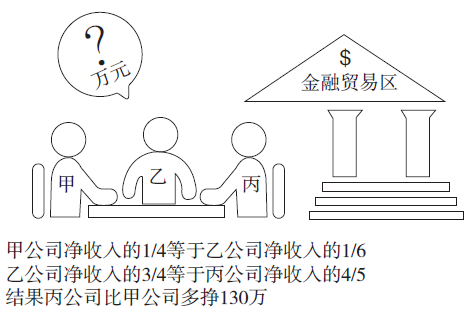
请你帮他们计算一下,乙公司挣了( )万元钱。

请你帮他们计算一下,乙公司挣了( )万元钱。
A.
420
B.
480
C.
430
D.
470
第 52 题
单选题
再往前,是化工展区,B公司是西亚有名的化工公司,正在为“一带一路”建设调配一种新型涂料,已知信息如下:

请你帮他计算一下,如果花同样的钱分别购买X型号、Y型号两种涂料配成Z型号新型涂料,那么配成的Z型号新型涂料每千克( )元。

请你帮他计算一下,如果花同样的钱分别购买X型号、Y型号两种涂料配成Z型号新型涂料,那么配成的Z型号新型涂料每千克( )元。
A.
13
B.
12
C.
14
D.
11
第 53 题
单选题
接着,调配人员拿出一个烧杯,其中有100克某物质溶液,调配人员将20克浓度为40%的同种物质溶液加入其中后浓度变成了50%,请你帮助他们计算一下,如果调配人员再往烧杯中加入20克水,则烧杯中溶液的浓度变成了( )。
A.
49%
B.
42.9%
C.
37.2%
D.
30%
第 54 题
单选题
制作这种新型溶液需要至少两个人合作才可以。已知信息如下:

请你计算一下,如果让甲丁搭档,那么需要( )天。

请你计算一下,如果让甲丁搭档,那么需要( )天。
A.
16
B.
22
C.
14
D.
24
第 55 题
单选题
这种新型的溶液配置好后,要从A城市运到B城市进行销售,AB两城市之间相距360千米,可以用船来运输,船以恒定速度的运行时间如下:两城市之间相距360千米,从A城市到B城市6小时,从B城市到A城市10小时。
请你计算一下,河水的流速是( )千米/时。
请你计算一下,河水的流速是( )千米/时。
A.
10
B.
12
C.
6
D.
24
第 56 题
单选题
商品运到B城市后,销售人员准备出售这种新型的溶液,定价为每桶100元,预计出售80桶,根据测算,商品价格每下降1元,将多出售4桶。若减价5%,增加了商品销量,那么获得的利润比原来预定的多了100元,请你帮忙算一下,该商品每桶的成本是( )元。
A.
48
B.
25
C.
70
D.
90
第 57 题
单选题
销售人员还出售两种小规格的溶液,价格如下:
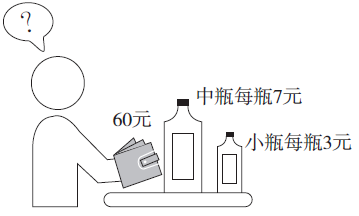
顾客要用60元买这两种瓶的溶液,且正好花完。那么,他最多能买到中瓶和小瓶两种溶液共( )瓶。

顾客要用60元买这两种瓶的溶液,且正好花完。那么,他最多能买到中瓶和小瓶两种溶液共( )瓶。
A.
4
B.
8
C.
12
D.
16
第 58 题
单选题
帮助化工展区的企业解决了问题后,你发现已经到了中午就餐时间,你来到园区的餐饮区,看到有烧烤店,你打算买些烤肉片作为午餐。烧烤店工作人员在烤肉片的时候,两面都要烤,第一面需要2分钟,第二面需要1分钟,你买了3片肉片,但你发现烤架上一次只能放两片肉,最短需要( )分钟才能将3片肉全部烤完。
A.
7
B.
6
C.
5
D.
4
第 59 题
单选题
在等待烤肉的过程中,你要了一杯500克的盐水解渴,盐水的浓度为18%,杯子编号为A,你觉得有点咸,于是又另外要了一杯500克的水,杯子编号为W,你把一半盐水从A杯倒入W杯子的水中,混合后再把盐水的一半从W杯倒入A杯盐水中,混合后又把A杯子中的一部分倒入W杯中,使A杯和W杯中的盐水同样多,那么请你计算一下,最后W杯盐水的百分比浓度为( )。
A.
12%
B.
10%
C.
7.2%
D.
18%
第 60 题
单选题
点完烤肉和盐水后,发现只有一个空着的位置可以就餐。店员告诉你,除了你以外,还有另外三位顾客也在等这个空位置就餐,你们四位顾客的就餐时间长短不同,分别如下:

因为目前只有这一个空位置可用,所以其中一位顾客在就餐时,其他三位顾客需要等待。请你计算一下,按使四位顾客等待的总时间最少安排顺序。四位顾客要等待的总时间最少是( )分钟。

因为目前只有这一个空位置可用,所以其中一位顾客在就餐时,其他三位顾客需要等待。请你计算一下,按使四位顾客等待的总时间最少安排顺序。四位顾客要等待的总时间最少是( )分钟。
A.
105
B.
165
C.
201
D.
300
第 61 题
单选题
人工智能景区,一家做智能机器人的公司,正在展出他们新开发的计算机器人,计算机器人给你出了几道计算题,你能计算出正确的答案吗?
486÷(243÷973)÷(973÷575)÷(575÷25)÷(25÷137)÷(137÷23)÷(23÷2)=( )。
486÷(243÷973)÷(973÷575)÷(575÷25)÷(25÷137)÷(137÷23)÷(23÷2)=( )。
A.
4
B.
243
C.
486
D.
1
第 62 题
单选题
35978-31534+44576-40132+15498-11054+79466-75022+87690-83246=( )。
A.
2222
B.
22220
C.
1
D.
0
第 63 题
单选题
某公司希望你能帮助他们,把产品介绍翻译成中文,你马上联系了中国的翻译公司,请他们派出2名翻译人员进行翻译,甲翻译员单独翻译,需要12小时可以完成,乙翻译员单独翻译,需要9小时可以完成,如果按照甲先乙后的顺序,每人每次1小时轮流进行,你帮他们计算一下,完成这件翻译工作需要( )小时。


A.

B.
10
C.
11
D.

第 64 题
单选题
之后,你来到了汽车展区,西亚的某汽车销售商专门销售中国汽车,你向他们了解了中国汽车在西亚的销售情况,此销售商本年度所销售的汽车台数比上一年度上升了20%,而每台的价格比上一年度下降了20%,如果本年度汽车销售商的汽车销售额为6000万元,那么请你帮他们计算一下,上一年度的汽车销售额是( )。
A.
5800万元
B.
6000万元
C.
6250万元
D.
6600万元
第 65 题
单选题
西亚另外一个零件公司负责为中国汽车生产商加工汽车零件。他们现在有原材料500吨,需要在20日刚好将这500吨原材料全部加工成零件提供给中国汽车生产商。该公司每日只能加工一种零件,精密零件或普通零件。加工精密零件每日消耗原材料10吨,加工普通零件每日消耗原材料30吨,加工精密零件每消耗1吨原材料可以盈利1050元,加工普通零件每消耗1吨原材料可以盈利270元,请你帮助他们计算一下,该公司完成这项工作后可以盈利( )元。
A.
174000
B.
162000
C.
210000
D.
486000
第 66 题
单选题
博览会上,汽车销售商、生产商、零售商三家公司谈判愉快,准备签署合作协议,但是他们忘记带重要的文件,于是他们匆匆赶到机场。分别乘坐甲、乙、丙三架飞机回各自公司取文件,三架飞机于上午11∶00同时从机场出发,再次回到机场的时间如下:

假设这三架飞机中途不休息,请问他们下次同时到达该机场的时间将会是( )。

假设这三架飞机中途不休息,请问他们下次同时到达该机场的时间将会是( )。
A.
11点整
B.
11点40分
C.
7点整
D.
12点整
第 67 题
单选题
博览会上还有关于中国的图书出售,有甲、乙、丙三种书籍。甲、乙两种书的数量之比是6∶5,如果甲销售出去 ,丙销售出去一部分,则甲和丙售出的数量比是5∶4,这两种书剩余的数量相等,请你计算一下,甲、乙、丙这三种书原来的数量比是( )。
,丙销售出去一部分,则甲和丙售出的数量比是5∶4,这两种书剩余的数量相等,请你计算一下,甲、乙、丙这三种书原来的数量比是( )。
 ,丙销售出去一部分,则甲和丙售出的数量比是5∶4,这两种书剩余的数量相等,请你计算一下,甲、乙、丙这三种书原来的数量比是( )。
,丙销售出去一部分,则甲和丙售出的数量比是5∶4,这两种书剩余的数量相等,请你计算一下,甲、乙、丙这三种书原来的数量比是( )。
A.
18∶15∶13
B.
30∶25∶26
C.
6∶5∶16
D.
6∶5∶26
第 68 题
单选题
在博览会当天还安排了歌舞表演,节目上原有歌舞类3个节目,组委会想保持这3个歌舞节目的相对顺序不变,再添加进去2个节目。请你帮他们计算一下,安排方法有( )种。
A.
20
B.
12
C.
6
D.
4
第 69 题
单选题
原有3个节目的演员中,有10个26岁,6个27岁,4个25岁三个年龄的演员,现在组委会将从中随机挑选演员,如果需要保证其中有27岁的演员,请你帮忙计算一下,至少要选出( )个演员。
A.
18
B.
17
C.
15
D.
14
第 70 题
单选题
新增的两个节目中,有两个小演员,一个是弟弟今年8岁,另外一个是姐姐今年12岁,弟弟给你出了一个有趣的问题,当弟弟和姐姐的岁数和是36岁时,姐姐多少岁?
A.
22
B.
24
C.
20
D.
18
第 71 题
单选题
回答完弟弟的问题,姐姐也出了一个问题,某年2月有5个星期三,则当年7月1日为星期几?
A.
星期六
B.
星期日
C.
星期五
D.
星期四
第 72 题
单选题
节目表演后,还有抽奖活动,所有参会者都可参与抽奖,一个袋中装有编号为0到9的十个完全相同的球,你可以在袋中摸球,一共摸两次,每次一个,摸完第一个后,将球放回,再摸第二个球。如果第一次摸出球的数字比第二次小,就可以获奖。你计算一下,你获奖概率是( )。
A.
45%
B.
85%
C.
25%
D.
5%
第 73 题
单选题
在本届博览会上还设置了五个奖项。A公司的产品参加了所有的五个奖项的评比,这五个奖项的计分规则都是百分制。A公司产品的成绩如下:甲奖项得到94分,乙奖项得分最高,丙奖项得分等于甲奖项和丁奖项的平均分。丁奖项的得分等于五个奖项的平均分,戊奖项得分比丙奖项多2分,并且是五个奖项中第二高的分数。
那么,请你计算一下,A公司产品在丁奖项得了( )分。
那么,请你计算一下,A公司产品在丁奖项得了( )分。
A.
95
B.
94
C.
96
D.
97
第 74 题
单选题
中亚的各国学者们都到齐了,考察团准备出发了。这时,对于如何到中国,大家产生了分歧。如果A选择火车或飞机,则学者B就会跟他一起去;只要学者A不乘坐火车去中国,学者C就会跟她一起去。实际上,最近学者B一直闭门不出也不想外出。
根据以上陈述,推断为真的是( )
(1)学者A没有乘坐飞机去中国;
(2)学者A没有乘坐火车去中国;
(3)学者A和C在一起
根据以上陈述,推断为真的是( )
(1)学者A没有乘坐飞机去中国;
(2)学者A没有乘坐火车去中国;
(3)学者A和C在一起
A.
三个推断都正确
B.
只有(1)和(2)正确
C.
只有(1)和(3)正确
D.
只有(1)正确
第 75 题
单选题
学者们决定选出一个临时的小组进行考察团的管理工作。大家从下图的人员中选出四个人。
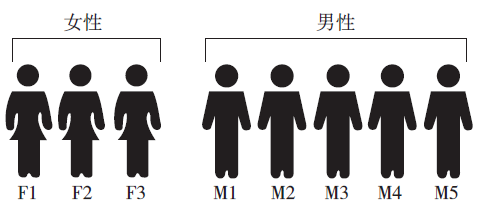
组成管理小组的条件是:
(1)组内男性和女性都有;
(2)F1和M1不能都入选;
(3)F2和F3不能都入选;
(4)如果选了M5,那么就不选M3。
结果是M1入选了,可以得出以下哪项为真?( )

组成管理小组的条件是:
(1)组内男性和女性都有;
(2)F1和M1不能都入选;
(3)F2和F3不能都入选;
(4)如果选了M5,那么就不选M3。
结果是M1入选了,可以得出以下哪项为真?( )
A.
M3在组内,那么,M5也有可能在组内
B.
F2和F3至少有一个在组内
C.
M2不可能在组内
D.
组内可能有F1
第 76 题
单选题
管理小组的成员确定后,还需要从F1、F2、F3中选出一名临时的会计,以便统一负责旅行中的财务工作,选择标准是会制作财务报表。F1说:我会。F2说:我不会。F3说:F1不会。
如果这三句话只有一个是真的,那么会制作财务报表的是( )。
如果这三句话只有一个是真的,那么会制作财务报表的是( )。
A.
无法判断
B.
F3
C.
F2
D.
F1
第 77 题
单选题
大家决定从六个国家中各带一些学者。每个国家所派遣的学者数量,呈现一定的规律。看了前五个国家派遣的学者数量你能推算出第六个国家派遣的学者数量吗?(此题有两个答案,不支持作答,仅供参考)


A.
40或54
第 78 题
单选题
六个国家的学者都到齐后,每个国家都交了一定的旅行费用。每个国家交的旅行费用,是按照一定的规律排列的。看了前五个国家交的费用,你能推算出第六个国家交的费用吗?


A.
107
B.
67
C.
1034
D.
690
第 79 题
单选题
收齐旅行费用后,你为大家买了火车票。火车票的号码按照一定的规律排列。看了前五个火车票号码后你能推算出第六个火车票的号码吗?


A.
3
B.
4
C.
5
D.
6
第 80 题
单选题

A.
A
B.
B
C.
C
D.
D
第 81 题
单选题
上了火车后,你发现在一节火车厢中,一个是石家庄人,两个人是北方人,一个人是福州人,三个人只做食品生意,两个人只做运输生意。如果以上介绍涉及该车厢所有人,那么,该节车厢共有多少位乘客?
A.
无法确定
B.
最少有5位,最多有8位
C.
最少有7位,最多有9位
D.
最少有6位,最多有7位
第 82 题
单选题
各位学者都上了车,各自坐好后,列车员拿来了图书供大家阅览。列车员问学者AA想看什么类的书。
列车员问:“想看什么类的书?”
学者AA说:“我不像讨厌文学那样讨厌地理,我不像讨厌军事那样讨厌科教,我不像喜欢艺术那样喜欢地理,我对科教不如对文学那样喜欢。”
学者AA最后会选择( )。
列车员问:“想看什么类的书?”
学者AA说:“我不像讨厌文学那样讨厌地理,我不像讨厌军事那样讨厌科教,我不像喜欢艺术那样喜欢地理,我对科教不如对文学那样喜欢。”
学者AA最后会选择( )。
A.
地理
B.
艺术
C.
科教
D.
文学
第 83 题
单选题
学者A问列车员,他选择的书多少钱?列车员告诉她,这本书的价格就是下面这组数中,空缺的第五个数。学者A选择的这本书多少钱?
1元,6元,15元,28元,( )元,66元
A.
30
B.
45
C.
50
D.
60
第 84 题
单选题
学者B拿了一本关于中国年画的书。看完书后其表示:“只有民族的,才是世界的;只有世界的,才是人类的。年画是民族的。”
你根据这一判断,可能推出( )。
你根据这一判断,可能推出( )。
A.
年画不是人类的,但它是世界的
B.
年画是人类的,但它不是世界的
C.
年画是世界的,也是人类的
D.
年画不一定是世界的,但它是民族的
第 85 题
单选题
学者B的这个观点,出自于书中的某一页的描述。这一页的页码,是下面这组数中空缺的第六个数。你能找出是书中的哪一页吗?
第3页,第4页,第7页,第11页,第18页,第( )页
第3页,第4页,第7页,第11页,第18页,第( )页
A.
27
B.
29
C.
36
D.
54
第 86 题
单选题
学者B拿的这本中国年画图书的价钱是下面这组数中空缺的第五个数字。你能告诉她这本书是多少钱吗?
12.5, 8, 4.5, 2, ( )
12.5, 8, 4.5, 2, ( )
A.
0
B.
0.5
C.
1
D.
1.5
第 87 题
单选题
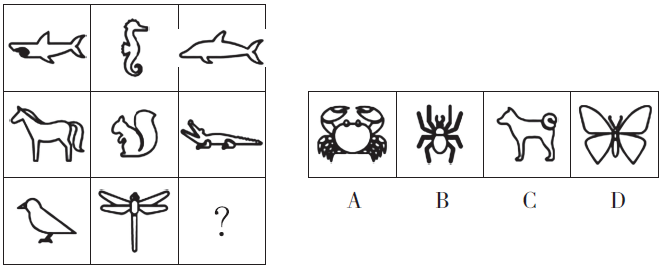
A.
A
B.
B
C.
C
D.
D
第 88 题
单选题
这本关于动物学图书的价钱是下面这组数中空缺的第五个数字,你能告诉他这本书是多少钱吗?
1, 3, 7, 13, ( ), 31
1, 3, 7, 13, ( ), 31
A.
16
B.
17
C.
18
D.
21
第 89 题
单选题
学者D选了一本关于图形推理的书。其中有一题很有趣,学者D想考考你,请你从所给的选择项中,选出最合适的一项填在问号处,使之呈现一定的规律性。( )
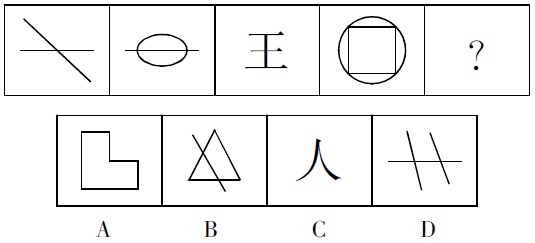

A.
A
B.
B
C.
C
D.
D
第 90 题
单选题

A.
A
B.
B
C.
C
D.
D
第 91 题
单选题
学者G也拿出一个方格的游戏,看大家谁能做的出来。根据前四幅图片的规律,你能选出正确的第五幅图吗?


A.
A
B.
B
C.
C
D.
D
第 92 题
单选题
学者H在玩一个看似很难的黑白棋的游戏。你要从前三幅图片中,找到游戏规律,然后选出问号处的图案,你就可以获胜。那么你应该为问号处选择哪一幅图案呢?( )


A.
A
B.
B
C.
C
D.
D
第 93 题
单选题
学者J正在玩火柴棒游戏。他用五根火柴棒依次拼了4个图形,这四个图形是有一定规律的。你能找出火柴棒的规律,并在问号处选出正确的图形吗?( )
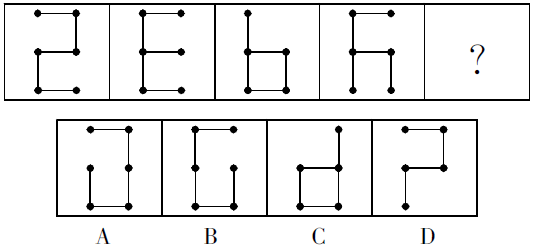

A.
A
B.
B
C.
C
D.
D
第 94 题
单选题
有三个学者,甲、乙、丙,他们同时在解答刚才学者J出的题目。

已知:答对的人说真话,答错的人说假话。
请你确定下面选项( )是真的。

已知:答对的人说真话,答错的人说假话。
请你确定下面选项( )是真的。
A.
甲和乙都答错了
B.
甲和丙都答错了
C.
乙答错了
D.
乙和丙都答错了
第 95 题
单选题
学者K在做一个有趣的统计。每经过一段时间,她会把手表上的时间画在纸上。画了四幅图案。其中的规律,你是否也发现了呢?请为问号处,选出正确的第五幅时间图吧。( )
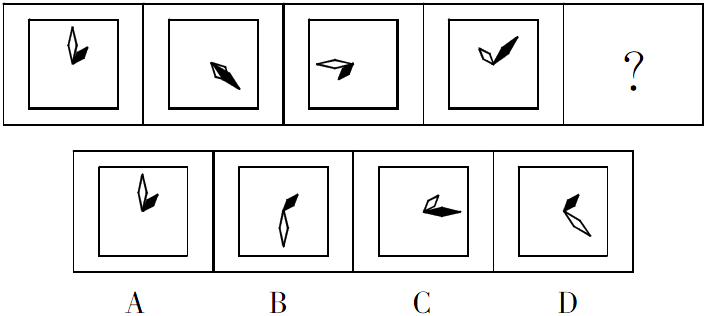

A.
A
B.
B
C.
C
D.
D
第 96 题
单选题
经过长时间航行,大家都有点口渴了,列车员为大家端来了茶水。一共有四壶茶,每个茶壶都写着一句话,如只有一个为真话,那么( )为真。
第一个:“本茶壶中有红茶”;第二个:“所有的茶壶里都有绿茶”;第三个:“本茶壶中没有白茶”;第四个:“有些茶壶中没有绿茶”。
第一个:“本茶壶中有红茶”;第二个:“所有的茶壶里都有绿茶”;第三个:“本茶壶中没有白茶”;第四个:“有些茶壶中没有绿茶”。
A.
第一个壶上的字
B.
第二个壶上的字
C.
第三个壶上的字
D.
第四个壶上的字
第 97 题
单选题
( )是指商业银行没有遵循法律、规则和准则可能遭受法律制裁、监管处罚、重大财务损失和声誉损失的风险。
A.
合规风险
B.
战略风险
C.
声誉风险
D.
市场风险
第 98 题
单选题
国际收支包括经常项目和资本项目。经常项目主要反映一国的贸易和劳务往来状况,包括贸易收支、劳务收支和( ),是最具综合性的对外贸易指标。
A.
单方面转移
B.
企业借贷
C.
政府和银行的借款
D.
直接投资
第 99 题
单选题
法定存款准备金是指商业银行为保证客户提取存款和( )需要而准备的资金,包括商业银行的库存现金和缴存中央银行的准备金存款两部分。
A.
同业拆借
B.
发放贷款
C.
资金清算
D.
市场交易
第 100 题
单选题
金融经济研究部门:中国推行的改革取得的成就有目共睹。有海外专家指出,中国实施的宏观调控和风险管控取得显著成就,中国巧妙地在保持经济增长的同时清理金融领域存在的问题,漂亮地完成了经济调控的“高难度动作”。如此出色的金融经济水平背后是出色的理论基础。你为此部门的工作人员,培训了相关的金融经济的理论和实践知识。
有交易双方信息不对称和市场价格下降产生的劣质品驱逐优质品,进而出现市场交易产品平均质量下降的现象,称为( )。
有交易双方信息不对称和市场价格下降产生的劣质品驱逐优质品,进而出现市场交易产品平均质量下降的现象,称为( )。
A.
逆向选择
B.
市场扭曲
C.
劣品选择
D.
市场平衡
第 101 题
单选题
在金融监管的对象中,一国的整个金融体系都可视为金融监管的对象,包括国内银行业和非银行金融机构等,以下属于准金融机构的是( )。
A.
小额贷款公司
B.
城市商业银行
C.
基金管理公司
D.
银行附属公司
第 102 题
单选题
股票估值中的绝对估值,是通过对上市公司历史及当前的基本面分析和对未来反映公司经营状况的财务数据的预测,获得上市公司股票的内在价值。以下属于绝对估值的方法是( )。
A.
现金流贴现定价模型
B.
企业价值倍数估值法
C.
市场盈PE估值方法
D.
EV/EBITDAR倍数法
第 103 题
单选题
预期通货膨胀理论由货币主义者提出,强调现在对未来的影响,与其很相近的通货膨胀理论是( )。
A.
结构性通货膨胀理论
B.
需求拉上的通货膨胀理论
C.
惯性通货膨胀理论
D.
供给推动的通货膨胀理论
第 104 题
单选题
产业投资基金一般是指向具有高增长潜力的未上市企业进行股权或准股权投资,并参与被投资企业的经营管理,以期所投资企业发育成熟后通过股权转让实现资本增值,关于契约型产业投资基金的说法错误的是( )。
A.
契约型产业投资基金的投资不是股东,仅是信托契约的当事人和基金的受益者,无权参与管理决策
B.
契约型产业投资基金不是法人,必须委托管理公司管理运作基金资产,所有权和经营权彻底分离
C.
是以股份公司形式存在或者以有限合伙形式设立,基金的每个投资者都是基金公司的股东或者投资人
D.
由于管理公司拥有充分的管理和运作基金的权力,基金资产的支配不会被追求短期利益的意图所影响
第 105 题
单选题
在资本不完全流动的浮动汇率下,扩张性的货币政策,一般不会出现的是( )。
A.
资本涌入
B.
收入增加
C.
利率下降
D.
进口增加
第 106 题
单选题
由商品的价格变动所引起的商品相对价格的变动,进而由商品的相对价格变动所引起的商品需求量的变动,称为:
A.
挤出效应
B.
替代效应
C.
收入效应
D.
外部效应
第 107 题
单选题
微观经济政策是指为提高资源配套效率、调节微观经济行为主体关系的有关政策,以下属于微观经济政策的是( )。
A.
价格政策
B.
需求管理
C.
国际经济政策
D.
供给管理
第 108 题
单选题
在基础汇率的基础上计算出来的本币与非关键货币之间的汇率,规范的术语称为( )。
A.
换算汇率
B.
套算汇率
C.
折算汇率
D.
基本汇率
第 109 题
单选题
财会部门:财会部门在制定会计政策和处理会计事物中,非常需要了解中国的会计事物。因为随着中国经济的快速发展,国际经济重心地位的确定,使得中国的会计理论、方法体系、行为方式、规范范式等在国际会计中起到示范作用,逐步被国际会计认可接受。你为他们重点培训了三个关于中国财会领域的知识点。
中国企业会计准则体系包括基本准则、具体准则和应用指南。具体准则是在基本准则的指导下,处理会计具体业务标准的规范,其内容不包括( )。
中国企业会计准则体系包括基本准则、具体准则和应用指南。具体准则是在基本准则的指导下,处理会计具体业务标准的规范,其内容不包括( )。
A.
会计框架准则
B.
财务报告准则
C.
一般业务准则
D.
特殊行业和特殊业务准则
第 110 题
单选题
会计分录在实际工作中,是通过填制记账凭证来实现的,它是保证会计记录正确可靠的重要环节。会计分录两种,即( )。
A.
标准分录和特殊分录
B.
单一分录和综合分录
C.
简单分录和复杂分录
D.
简单分录和复合分录
第 111 题
单选题
根据《审计署关于内部审计工作的规定》,中国内部审计的对象不包含( )。
A.
本部门的会计账目
B.
所属单位的会计账目
C.
本单位注册资金的验证
D.
所属单位财务管理的咨询服务
第 112 题
单选题
对于公司各种权力合理分配、相互制约,进行配置的原则是( )。
A.
权力均衡原则
B.
赋权配置原则
C.
分权制衡原则
D.
授权约束原则
第 113 题
单选题
组织内部在遇到紧急情况或处理与公司利益关系重大的问题上,最佳的冲突处理方式是( )。
A.
回避
B.
妥协
C.
开诚合作
D.
强制
第 114 题
单选题
根据我国《商业银行法》第43条规定,商业银行目前在我国境内可以开展的业务是( )。
A.
非自用不动产投资
B.
信托投资业务
C.
证券投资业务
D.
金融债券买卖
第 115 题
多选题
《中华人民共和国民法总则》规定,承担民事责任的方式主要有( )。
第 116 题
多选题
《中华人民共和国公司法》规定,公司营业执照应当载明的资本事项中不包括( )。
第 117 题
单选题
根据我国《合同法》规定,下列关于合同内容约定不明确的处理办法,不正确的是( )。
A.
履行地点不明确,交付不动产的,在接受货币一方所在地履行
B.
价款或者报酬不明确的,按照订立合同时履行地的市场价格履行
C.
质量要求不明确的,按照相关的国家标准、行业标准履行
D.
履行期限不明确的,债务人可以随时履行或者随时要求履行,但应给予准备时间
第 118 题
单选题
中国A股在2018年6月被正式纳入( ),对于A股国际化进程是一个重要契机。作为全球最具影响力的指数和全球第二大市值股票市场,A股的纳入,将改善中国股市在全球基准指数中代表性“严重不足”的局面。
A.
StockQ国际股市指数
B.
股票价格指数(Stock Price Index)
C.
MSCI(Morgan Stanley Capital International)
D.
金融时报证券交易所指数
第 119 题
单选题
由于工作和实施方面的原因,自公司宣布发放股利至公司实际将股利发出要有一定的时间间隔。由于上市公司股票在此时间间隔内处在不停的交易之中,公司股东会随股票交易而不断易人,为了明确股利的归属,公司有( )。
A.
股权登记日
B.
股权归属日
C.
股权有效日
D.
股权起始日
第 120 题
单选题
对上市公司的资产进行剥离出现的方式主要有两种:单纯资产剥离方式和战略性资产剥离方式,以下关于战略性资产剥离的特点,说法不准确的是( )。
A.
剥离时不可以以零价格转让
B.
不良资产和负债一同剥离
C.
剥离后对剥离资产普遍进行破产、清算
D.
其实质是对上市公司的不良债务进行剥离
第 121 题
单选题
IPO是指一家企业或公司(股份有限公司)第一次将它的股份向公众出售。《中华人民共和国证券法》中对股份发行要求,以下那一项是不正确的?( )
A.
公开发行的股份占公司股份总数的25%以下
B.
公司股本总额不少于人民币3000万元
C.
公司在三年内无重大违法行为,财务会计报告无虚假记载
D.
股票经国务院证券管理部门核准已公开发行
第 122 题
单选题
根据我国《证劵法》规定,关于收购要约的表述,不正确的是( )。
A.
收购要约的期限不得少于30日,并不得超过60日
B.
在收购要约的有效期限内,收购人可以根据经营策略撤回其收购要约
C.
收购人在依照规定报送上市公司收购报告书之日起15日后,公告其收购要约
D.
收购人需要变更收购要约中的事项的,必须事先向监管机构提出报告,经获准后予以公告
第 123 题
单选题
The best-selling sports drink, Zumo, is produced by Zumospa, a food and drinks company based in Valencia, Spain. In the last financial year, Zumo contributed 30 million Euros to Zumospa’s annual sales revenue, accounting for 20% of the company’s total turnover. It is, in fact, Zumospa’s cash cow, generating more revenue than any other of its products.
At present, Zumo is sold only in Europe. However, the sports drink market is the most rapidly growing segment of the world beverage market. Zumospa is now looking outside Spain for markets and would like to make Zumo a global brand.
Zumospa needs to reposition Zumo for the global market. Initial research suggests that Zumo is perceived as a Spanish drink, and its close identification with Spain may not be suitable when developing a global brand.
What is Zumo
At present, Zumo is sold only in Europe. However, the sports drink market is the most rapidly growing segment of the world beverage market. Zumospa is now looking outside Spain for markets and would like to make Zumo a global brand.
Zumospa needs to reposition Zumo for the global market. Initial research suggests that Zumo is perceived as a Spanish drink, and its close identification with Spain may not be suitable when developing a global brand.
What is Zumo
A.
It is a food and drink company.
B.
It is a sports drink.
C.
It is a soft drink.
D.
It is a Spanish food.
第 124 题
单选题
The best-selling sports drink, Zumo, is produced by Zumospa, a food and drinks company based in Valencia, Spain. In the last financial year, Zumo contributed 30 million Euros to Zumospa’s annual sales revenue, accounting for 20% of the company’s total turnover. It is, in fact, Zumospa’s cash cow, generating more revenue than any other of its products.
At present, Zumo is sold only in Europe. However, the sports drink market is the most rapidly growing segment of the world beverage market. Zumospa is now looking outside Spain for markets and would like to make Zumo a global brand.
Zumospa needs to reposition Zumo for the global market. Initial research suggests that Zumo is perceived as a Spanish drink, and its close identification with Spain may not be suitable when developing a global brand.
Approximately what is Zumospa’s total turnover
At present, Zumo is sold only in Europe. However, the sports drink market is the most rapidly growing segment of the world beverage market. Zumospa is now looking outside Spain for markets and would like to make Zumo a global brand.
Zumospa needs to reposition Zumo for the global market. Initial research suggests that Zumo is perceived as a Spanish drink, and its close identification with Spain may not be suitable when developing a global brand.
Approximately what is Zumospa’s total turnover
A.
30 million euros.
B.
20 million euros.
C.
150 million euros.
D.
100 million euros.
第 125 题
单选题
The best-selling sports drink, Zumo, is produced by Zumospa, a food and drinks company based in Valencia, Spain. In the last financial year, Zumo contributed 30 million Euros to Zumospa’s annual sales revenue, accounting for 20% of the company’s total turnover. It is, in fact, Zumospa’s cash cow, generating more revenue than any other of its products.
At present, Zumo is sold only in Europe. However, the sports drink market is the most rapidly growing segment of the world beverage market. Zumospa is now looking outside Spain for markets and would like to make Zumo a global brand.
Zumospa needs to reposition Zumo for the global market. Initial research suggests that Zumo is perceived as a Spanish drink, and its close identification with Spain may not be suitable when developing a global brand.
What can be inferred from the article
At present, Zumo is sold only in Europe. However, the sports drink market is the most rapidly growing segment of the world beverage market. Zumospa is now looking outside Spain for markets and would like to make Zumo a global brand.
Zumospa needs to reposition Zumo for the global market. Initial research suggests that Zumo is perceived as a Spanish drink, and its close identification with Spain may not be suitable when developing a global brand.
What can be inferred from the article
A.
A Spanish identification is not suitable for Zumo to tap into global market.
B.
Zumo is available in Europe and North America.
C.
Zumospa only produces sports drinks.
D.
Zumo does not need to change its brand name.
第 126 题
单选题
KGV is a traditional high-street music retailer. Based in Amsterdam, it has 12 stores in the Netherlands, three of which are megastores. Some years ago, it expanded into the rest of Europe and now owns 65 stores — eight of these are megastores.
The company is at present going through a difficult period. Over the last three years, profits have steadily fallen, from 450m Euros to 290m Euros. The megastores’ sales have risen by 8%, accounting for 55% of the company’s turnover, but the increased revenue has been achieved only by heavy expenditure on advertising and promotion. Fierce competition, a narrow product range and a lack of innovation are some of the reasons for KGV’s poor performance. The management is concerned, especially, that they are not exploiting the opportunities offered by selling through the Internet.
What kind of company is KGV
The company is at present going through a difficult period. Over the last three years, profits have steadily fallen, from 450m Euros to 290m Euros. The megastores’ sales have risen by 8%, accounting for 55% of the company’s turnover, but the increased revenue has been achieved only by heavy expenditure on advertising and promotion. Fierce competition, a narrow product range and a lack of innovation are some of the reasons for KGV’s poor performance. The management is concerned, especially, that they are not exploiting the opportunities offered by selling through the Internet.
What kind of company is KGV
A.
It is an advertising agency.
B.
It is a music studio.
C.
It is a consulting firm.
D.
It is a high-street music retailer.
第 127 题
单选题
KGV is a traditional high-street music retailer. Based in Amsterdam, it has 12 stores in the Netherlands, three of which are megastores. Some years ago, it expanded into the rest of Europe and now owns 65 stores — eight of these are megastores.
The company is at present going through a difficult period. Over the last three years, profits have steadily fallen, from 450m Euros to 290m Euros. The megastores’ sales have risen by 8%, accounting for 55% of the company’s turnover, but the increased revenue has been achieved only by heavy expenditure on advertising and promotion. Fierce competition, a narrow product range and a lack of innovation are some of the reasons for KGV’s poor performance. The management is concerned, especially, that they are not exploiting the opportunities offered by selling through the Internet.
What does the word “turnover” in Paragraph 2 mean
The company is at present going through a difficult period. Over the last three years, profits have steadily fallen, from 450m Euros to 290m Euros. The megastores’ sales have risen by 8%, accounting for 55% of the company’s turnover, but the increased revenue has been achieved only by heavy expenditure on advertising and promotion. Fierce competition, a narrow product range and a lack of innovation are some of the reasons for KGV’s poor performance. The management is concerned, especially, that they are not exploiting the opportunities offered by selling through the Internet.
What does the word “turnover” in Paragraph 2 mean
A.
The aggregate of worker replacements.
B.
An act or result of turning over.
C.
A change from a position to another.
D.
The total amount of business done in a given time.
第 128 题
单选题
KGV is a traditional high-street music retailer. Based in Amsterdam, it has 12 stores in the Netherlands, three of which are megastores. Some years ago, it expanded into the rest of Europe and now owns 65 stores — eight of these are megastores.
The company is at present going through a difficult period. Over the last three years, profits have steadily fallen, from 450m Euros to 290m Euros. The megastores’ sales have risen by 8%, accounting for 55% of the company’s turnover, but the increased revenue has been achieved only by heavy expenditure on advertising and promotion. Fierce competition, a narrow product range and a lack of innovation are some of the reasons for KGV’s poor performance. The management is concerned, especially, that they are not exploiting the opportunities offered by selling through the Internet.
What can be inferred from the article
The company is at present going through a difficult period. Over the last three years, profits have steadily fallen, from 450m Euros to 290m Euros. The megastores’ sales have risen by 8%, accounting for 55% of the company’s turnover, but the increased revenue has been achieved only by heavy expenditure on advertising and promotion. Fierce competition, a narrow product range and a lack of innovation are some of the reasons for KGV’s poor performance. The management is concerned, especially, that they are not exploiting the opportunities offered by selling through the Internet.
What can be inferred from the article
A.
KGV’s costs of promotion are high.
B.
KGV’s revenue has been steadily falling.
C.
The industry of music is very competitive.
D.
KGV was founded in the US.
第 129 题
单选题
China is an emerging economic giant with almost endless potential for business opportunities. Guan xi — meaning “connections” or “relationships” — is a Chinese way of doing business and is practically considered an art form there. It involves exchanging “favors” when you need something done. Many Chinese business people see it as a way to solidify relationships, get things done, and cultivate well-being.
To Westerners, however, it often looks more like graft in the form of bribery, nepotism, gift giving, and kickbacks. Transparency International, a German-based corruption watchdog, ranks China along with India, Russia, Turkey, Malaysia, and South Africa as the countries with the most rampant corruption.
However, China is cracking down by enacting stricter anti-corruption laws and prosecuting violators. In 2007, China’s former director of the State Food and Drug Administration was executed for taking bribes.
According to the passage, what is TRUE about Guan xi in the Chinese culture
To Westerners, however, it often looks more like graft in the form of bribery, nepotism, gift giving, and kickbacks. Transparency International, a German-based corruption watchdog, ranks China along with India, Russia, Turkey, Malaysia, and South Africa as the countries with the most rampant corruption.
However, China is cracking down by enacting stricter anti-corruption laws and prosecuting violators. In 2007, China’s former director of the State Food and Drug Administration was executed for taking bribes.
According to the passage, what is TRUE about Guan xi in the Chinese culture
A.
It involves money and power.
B.
It requires you to exchange favors to get things done.
C.
It is an art form of bribery in the business.
D.
It means connection or relationship among family members.
第 130 题
单选题
China is an emerging economic giant with almost endless potential for business opportunities. Guan xi — meaning “connections” or “relationships” — is a Chinese way of doing business and is practically considered an art form there. It involves exchanging “favors” when you need something done. Many Chinese business people see it as a way to solidify relationships, get things done, and cultivate well-being.
To Westerners, however, it often looks more like graft in the form of bribery, nepotism, gift giving, and kickbacks. Transparency International, a German-based corruption watchdog, ranks China along with India, Russia, Turkey, Malaysia, and South Africa as the countries with the most rampant corruption.
However, China is cracking down by enacting stricter anti-corruption laws and prosecuting violators. In 2007, China’s former director of the State Food and Drug Administration was executed for taking bribes.
What can be inferred from the passage
To Westerners, however, it often looks more like graft in the form of bribery, nepotism, gift giving, and kickbacks. Transparency International, a German-based corruption watchdog, ranks China along with India, Russia, Turkey, Malaysia, and South Africa as the countries with the most rampant corruption.
However, China is cracking down by enacting stricter anti-corruption laws and prosecuting violators. In 2007, China’s former director of the State Food and Drug Administration was executed for taking bribes.
What can be inferred from the passage
A.
Bribery, nepotism, gift giving, and kickbacks are illegal in the commercial activities.
B.
The German-based corruption watchdog is probably a committee which makes sure that companies do not act illegally or irresponsibly.
C.
Westerners are more critical about Guan xi in business.
D.
All of above.
第 131 题
单选题
China is an emerging economic giant with almost endless potential for business opportunities. Guan xi — meaning “connections” or “relationships” — is a Chinese way of doing business and is practically considered an art form there. It involves exchanging “favors” when you need something done. Many Chinese business people see it as a way to solidify relationships, get things done, and cultivate well-being.
To Westerners, however, it often looks more like graft in the form of bribery, nepotism, gift giving, and kickbacks. Transparency International, a German-based corruption watchdog, ranks China along with India, Russia, Turkey, Malaysia, and South Africa as the countries with the most rampant corruption.
However, China is cracking down by enacting stricter anti-corruption laws and prosecuting violators. In 2007, China’s former director of the State Food and Drug Administration was executed for taking bribes.
What’s the tone of the passage
To Westerners, however, it often looks more like graft in the form of bribery, nepotism, gift giving, and kickbacks. Transparency International, a German-based corruption watchdog, ranks China along with India, Russia, Turkey, Malaysia, and South Africa as the countries with the most rampant corruption.
However, China is cracking down by enacting stricter anti-corruption laws and prosecuting violators. In 2007, China’s former director of the State Food and Drug Administration was executed for taking bribes.
What’s the tone of the passage
A.
skeptical
B.
positive
C.
sarcastic
D.
objective
第 132 题
单选题
“Globalization” is in daily use throughout the world. Variously referred to as mondialisation in French, globalisierung in German, or Quan qui hua in China Scholte, 1996 , news articles, television, and even textbooks often use the word “globalization” to mean many different things. Author Jan Pieterse 1995 asserts there are almost as many conceptualizations of globalization as there are disciplines in the social sciences. Teachers and scholars in disciplines such as management, marketing, finance, accounting, and economics also use the word “globalization” to mean different things.
For example, some believe globalization is the absence of borders and barriers to trade between nations Ohmae, 1995 , but also it has been described as a shift in traditional patterns of international production, investment, and trade Dicken, 1992 . Another popular conception of globalization is that it is a business strategy that means doing everything the same everywhere Kanter and Dretler, 1998 . Others believe globalization is interconnections between overlapping interests of business and society Brown, 1992; Renesch, 1992 . As you can see, these definitions differ in significant ways. Because definitions, descriptions, and visions of globalization vary widely, it is difficult to know what it means for businesses to go “global.”
Which of the following statements is not implied by the underlined sentence
For example, some believe globalization is the absence of borders and barriers to trade between nations Ohmae, 1995 , but also it has been described as a shift in traditional patterns of international production, investment, and trade Dicken, 1992 . Another popular conception of globalization is that it is a business strategy that means doing everything the same everywhere Kanter and Dretler, 1998 . Others believe globalization is interconnections between overlapping interests of business and society Brown, 1992; Renesch, 1992 . As you can see, these definitions differ in significant ways. Because definitions, descriptions, and visions of globalization vary widely, it is difficult to know what it means for businesses to go “global.”
Which of the following statements is not implied by the underlined sentence
A.
There are many disciplines in the social science.
B.
There are less conceptions of globalization.
C.
The disciplines in the social science vary.
D.
The conceptions of globalization vary.
第 133 题
单选题
“Globalization” is in daily use throughout the world. Variously referred to as mondialisation in French, globalisierung in German, or Quan qui hua in China Scholte, 1996 , news articles, television, and even textbooks often use the word “globalization” to mean many different things. Author Jan Pieterse 1995 asserts there are almost as many conceptualizations of globalization as there are disciplines in the social sciences. Teachers and scholars in disciplines such as management, marketing, finance, accounting, and economics also use the word “globalization” to mean different things.
For example, some believe globalization is the absence of borders and barriers to trade between nations Ohmae, 1995 , but also it has been described as a shift in traditional patterns of international production, investment, and trade Dicken, 1992 . Another popular conception of globalization is that it is a business strategy that means doing everything the same everywhere Kanter and Dretler, 1998 . Others believe globalization is interconnections between overlapping interests of business and society Brown, 1992; Renesch, 1992 . As you can see, these definitions differ in significant ways. Because definitions, descriptions, and visions of globalization vary widely, it is difficult to know what it means for businesses to go “global.”
Which of the following statements about globalization has no reference
For example, some believe globalization is the absence of borders and barriers to trade between nations Ohmae, 1995 , but also it has been described as a shift in traditional patterns of international production, investment, and trade Dicken, 1992 . Another popular conception of globalization is that it is a business strategy that means doing everything the same everywhere Kanter and Dretler, 1998 . Others believe globalization is interconnections between overlapping interests of business and society Brown, 1992; Renesch, 1992 . As you can see, these definitions differ in significant ways. Because definitions, descriptions, and visions of globalization vary widely, it is difficult to know what it means for businesses to go “global.”
Which of the following statements about globalization has no reference
A.
Globalization is the absence of borders and barriers to trade between nations.
B.
Globalization is interconnections between different interests of business and society.
C.
Globalization is a shift in traditional patterns of international production, investment, and trade.
D.
Globalization is a business strategy that means doing everything the same everywhere.
第 134 题
单选题
“Globalization” is in daily use throughout the world. Variously referred to as mondialisation in French, globalisierung in German, or Quan qui hua in China Scholte, 1996 , news articles, television, and even textbooks often use the word “globalization” to mean many different things. Author Jan Pieterse 1995 asserts there are almost as many conceptualizations of globalization as there are disciplines in the social sciences. Teachers and scholars in disciplines such as management, marketing, finance, accounting, and economics also use the word “globalization” to mean different things.
For example, some believe globalization is the absence of borders and barriers to trade between nations Ohmae, 1995 , but also it has been described as a shift in traditional patterns of international production, investment, and trade Dicken, 1992 . Another popular conception of globalization is that it is a business strategy that means doing everything the same everywhere Kanter and Dretler, 1998 . Others believe globalization is interconnections between overlapping interests of business and society Brown, 1992; Renesch, 1992 . As you can see, these definitions differ in significant ways. Because definitions, descriptions, and visions of globalization vary widely, it is difficult to know what it means for businesses to go “global.”
What probably will be further discussed in the following paragraph
For example, some believe globalization is the absence of borders and barriers to trade between nations Ohmae, 1995 , but also it has been described as a shift in traditional patterns of international production, investment, and trade Dicken, 1992 . Another popular conception of globalization is that it is a business strategy that means doing everything the same everywhere Kanter and Dretler, 1998 . Others believe globalization is interconnections between overlapping interests of business and society Brown, 1992; Renesch, 1992 . As you can see, these definitions differ in significant ways. Because definitions, descriptions, and visions of globalization vary widely, it is difficult to know what it means for businesses to go “global.”
What probably will be further discussed in the following paragraph
A.
the definition of the term “globalization”
B.
how businesses go “global”
C.
how definitions differ from each other
D.
what globalization means for businesses
第 135 题
单选题
Finding a trustworthy supplier
This is perhaps the most important step in your import business. A serious and dependable supplier minimizes any concerns on quality, trust and disputes.
There are a number of sourcing sites where you can find suppliers from massive directories. To find the right one can be a laborious task, but your work can be made easier by going to sites that screen suppliers before they are listed — like Global Sources Online. Under their “verified suppliers” system, suppliers need to have their company information and contact person verified and are visited 3 times in-person before being authenticated as a “verified supplier”. This also means if you pick a “verified supplier”, you can be sure the contact person is a legitimate representative and the company is registered and export-ready.
Once you’re in contact with prospective suppliers, address all your quality concerns with the right questions. State your requirements to suppliers clearly — like product warranty, key specifications and order terms. Alternatively, some suppliers will provide product samples if you ask, so you can first test them yourself. If you’re happy with the quality of this sample shipment, you can order in bulk. If possible, try and attend a sourcing fair to test samples free of charge. Most sourcing fairs are organized around themes like “Clothing & Garments” or “Electronics”, so buyers like you can meet all the specialized sellers of the products you want.
Factory visits and inspections
China’s business environment is changing rapidly, and you’d be surprised how much factories can develop in a year. If this is too much trouble for you, consider appointing a local agent or third-party quality 3PQ firm to inspect the factory on your behalf. Get someone who speaks the language and knows local business conditions enough to make a good judgment. Most agents usually charge by commission from the amount of goods you import, and also inspect the output before it gets shipped.
Who are the target readers of this article
This is perhaps the most important step in your import business. A serious and dependable supplier minimizes any concerns on quality, trust and disputes.
There are a number of sourcing sites where you can find suppliers from massive directories. To find the right one can be a laborious task, but your work can be made easier by going to sites that screen suppliers before they are listed — like Global Sources Online. Under their “verified suppliers” system, suppliers need to have their company information and contact person verified and are visited 3 times in-person before being authenticated as a “verified supplier”. This also means if you pick a “verified supplier”, you can be sure the contact person is a legitimate representative and the company is registered and export-ready.
Once you’re in contact with prospective suppliers, address all your quality concerns with the right questions. State your requirements to suppliers clearly — like product warranty, key specifications and order terms. Alternatively, some suppliers will provide product samples if you ask, so you can first test them yourself. If you’re happy with the quality of this sample shipment, you can order in bulk. If possible, try and attend a sourcing fair to test samples free of charge. Most sourcing fairs are organized around themes like “Clothing & Garments” or “Electronics”, so buyers like you can meet all the specialized sellers of the products you want.
Factory visits and inspections
China’s business environment is changing rapidly, and you’d be surprised how much factories can develop in a year. If this is too much trouble for you, consider appointing a local agent or third-party quality 3PQ firm to inspect the factory on your behalf. Get someone who speaks the language and knows local business conditions enough to make a good judgment. Most agents usually charge by commission from the amount of goods you import, and also inspect the output before it gets shipped.
Who are the target readers of this article
A.
Foreign entrepreneurs
B.
Job seekers
C.
Fresh graduates
D.
Company employees
第 136 题
单选题
Finding a trustworthy supplier
This is perhaps the most important step in your import business. A serious and dependable supplier minimizes any concerns on quality, trust and disputes.
There are a number of sourcing sites where you can find suppliers from massive directories. To find the right one can be a laborious task, but your work can be made easier by going to sites that screen suppliers before they are listed — like Global Sources Online. Under their “verified suppliers” system, suppliers need to have their company information and contact person verified and are visited 3 times in-person before being authenticated as a “verified supplier”. This also means if you pick a “verified supplier”, you can be sure the contact person is a legitimate representative and the company is registered and export-ready.
Once you’re in contact with prospective suppliers, address all your quality concerns with the right questions. State your requirements to suppliers clearly — like product warranty, key specifications and order terms. Alternatively, some suppliers will provide product samples if you ask, so you can first test them yourself. If you’re happy with the quality of this sample shipment, you can order in bulk. If possible, try and attend a sourcing fair to test samples free of charge. Most sourcing fairs are organized around themes like “Clothing & Garments” or “Electronics”, so buyers like you can meet all the specialized sellers of the products you want.
Factory visits and inspections
China’s business environment is changing rapidly, and you’d be surprised how much factories can develop in a year. If this is too much trouble for you, consider appointing a local agent or third-party quality 3PQ firm to inspect the factory on your behalf. Get someone who speaks the language and knows local business conditions enough to make a good judgment. Most agents usually charge by commission from the amount of goods you import, and also inspect the output before it gets shipped.
Why should businessmen make use of the sites that screen suppliers
This is perhaps the most important step in your import business. A serious and dependable supplier minimizes any concerns on quality, trust and disputes.
There are a number of sourcing sites where you can find suppliers from massive directories. To find the right one can be a laborious task, but your work can be made easier by going to sites that screen suppliers before they are listed — like Global Sources Online. Under their “verified suppliers” system, suppliers need to have their company information and contact person verified and are visited 3 times in-person before being authenticated as a “verified supplier”. This also means if you pick a “verified supplier”, you can be sure the contact person is a legitimate representative and the company is registered and export-ready.
Once you’re in contact with prospective suppliers, address all your quality concerns with the right questions. State your requirements to suppliers clearly — like product warranty, key specifications and order terms. Alternatively, some suppliers will provide product samples if you ask, so you can first test them yourself. If you’re happy with the quality of this sample shipment, you can order in bulk. If possible, try and attend a sourcing fair to test samples free of charge. Most sourcing fairs are organized around themes like “Clothing & Garments” or “Electronics”, so buyers like you can meet all the specialized sellers of the products you want.
Factory visits and inspections
China’s business environment is changing rapidly, and you’d be surprised how much factories can develop in a year. If this is too much trouble for you, consider appointing a local agent or third-party quality 3PQ firm to inspect the factory on your behalf. Get someone who speaks the language and knows local business conditions enough to make a good judgment. Most agents usually charge by commission from the amount of goods you import, and also inspect the output before it gets shipped.
Why should businessmen make use of the sites that screen suppliers
A.
Because those sites can legitimize suppliers.
B.
Because those sites are free of charge.
C.
Because those sites can verify the suppliers’ legitimacy.
D.
Because those sites can arrange factory visits for businessmen.
第 137 题
单选题
Finding a trustworthy supplier
This is perhaps the most important step in your import business. A serious and dependable supplier minimizes any concerns on quality, trust and disputes.
There are a number of sourcing sites where you can find suppliers from massive directories. To find the right one can be a laborious task, but your work can be made easier by going to sites that screen suppliers before they are listed — like Global Sources Online. Under their “verified suppliers” system, suppliers need to have their company information and contact person verified and are visited 3 times in-person before being authenticated as a “verified supplier”. This also means if you pick a “verified supplier”, you can be sure the contact person is a legitimate representative and the company is registered and export-ready.
Once you’re in contact with prospective suppliers, address all your quality concerns with the right questions. State your requirements to suppliers clearly — like product warranty, key specifications and order terms. Alternatively, some suppliers will provide product samples if you ask, so you can first test them yourself. If you’re happy with the quality of this sample shipment, you can order in bulk. If possible, try and attend a sourcing fair to test samples free of charge. Most sourcing fairs are organized around themes like “Clothing & Garments” or “Electronics”, so buyers like you can meet all the specialized sellers of the products you want.
Factory visits and inspections
China’s business environment is changing rapidly, and you’d be surprised how much factories can develop in a year. If this is too much trouble for you, consider appointing a local agent or third-party quality 3PQ firm to inspect the factory on your behalf. Get someone who speaks the language and knows local business conditions enough to make a good judgment. Most agents usually charge by commission from the amount of goods you import, and also inspect the output before it gets shipped.
According to the article, which of the following is the right order of finding a trustworthy supplier
This is perhaps the most important step in your import business. A serious and dependable supplier minimizes any concerns on quality, trust and disputes.
There are a number of sourcing sites where you can find suppliers from massive directories. To find the right one can be a laborious task, but your work can be made easier by going to sites that screen suppliers before they are listed — like Global Sources Online. Under their “verified suppliers” system, suppliers need to have their company information and contact person verified and are visited 3 times in-person before being authenticated as a “verified supplier”. This also means if you pick a “verified supplier”, you can be sure the contact person is a legitimate representative and the company is registered and export-ready.
Once you’re in contact with prospective suppliers, address all your quality concerns with the right questions. State your requirements to suppliers clearly — like product warranty, key specifications and order terms. Alternatively, some suppliers will provide product samples if you ask, so you can first test them yourself. If you’re happy with the quality of this sample shipment, you can order in bulk. If possible, try and attend a sourcing fair to test samples free of charge. Most sourcing fairs are organized around themes like “Clothing & Garments” or “Electronics”, so buyers like you can meet all the specialized sellers of the products you want.
Factory visits and inspections
China’s business environment is changing rapidly, and you’d be surprised how much factories can develop in a year. If this is too much trouble for you, consider appointing a local agent or third-party quality 3PQ firm to inspect the factory on your behalf. Get someone who speaks the language and knows local business conditions enough to make a good judgment. Most agents usually charge by commission from the amount of goods you import, and also inspect the output before it gets shipped.
According to the article, which of the following is the right order of finding a trustworthy supplier
A.
Go to sourcing sites — contact prospective suppliers — attend sourcing fairs — order
B.
Go to sourcing sites — visit factories — test samples — attend sourcing fairs — order
C.
Go to sourcing sites — contact prospective suppliers — state demands — test samples — order
D.
Go to sourcing sites — visit factories — state demands — test samples — order
第 138 题
单选题
Finding a trustworthy supplier
This is perhaps the most important step in your import business. A serious and dependable supplier minimizes any concerns on quality, trust and disputes.
There are a number of sourcing sites where you can find suppliers from massive directories. To find the right one can be a laborious task, but your work can be made easier by going to sites that screen suppliers before they are listed — like Global Sources Online. Under their “verified suppliers” system, suppliers need to have their company information and contact person verified and are visited 3 times in-person before being authenticated as a “verified supplier”. This also means if you pick a “verified supplier”, you can be sure the contact person is a legitimate representative and the company is registered and export-ready.
Once you’re in contact with prospective suppliers, address all your quality concerns with the right questions. State your requirements to suppliers clearly — like product warranty, key specifications and order terms. Alternatively, some suppliers will provide product samples if you ask, so you can first test them yourself. If you’re happy with the quality of this sample shipment, you can order in bulk. If possible, try and attend a sourcing fair to test samples free of charge. Most sourcing fairs are organized around themes like “Clothing & Garments” or “Electronics”, so buyers like you can meet all the specialized sellers of the products you want.
Factory visits and inspections
China’s business environment is changing rapidly, and you’d be surprised how much factories can develop in a year. If this is too much trouble for you, consider appointing a local agent or third-party quality 3PQ firm to inspect the factory on your behalf. Get someone who speaks the language and knows local business conditions enough to make a good judgment. Most agents usually charge by commission from the amount of goods you import, and also inspect the output before it gets shipped.
What can be inferred from Paragraph 4
This is perhaps the most important step in your import business. A serious and dependable supplier minimizes any concerns on quality, trust and disputes.
There are a number of sourcing sites where you can find suppliers from massive directories. To find the right one can be a laborious task, but your work can be made easier by going to sites that screen suppliers before they are listed — like Global Sources Online. Under their “verified suppliers” system, suppliers need to have their company information and contact person verified and are visited 3 times in-person before being authenticated as a “verified supplier”. This also means if you pick a “verified supplier”, you can be sure the contact person is a legitimate representative and the company is registered and export-ready.
Once you’re in contact with prospective suppliers, address all your quality concerns with the right questions. State your requirements to suppliers clearly — like product warranty, key specifications and order terms. Alternatively, some suppliers will provide product samples if you ask, so you can first test them yourself. If you’re happy with the quality of this sample shipment, you can order in bulk. If possible, try and attend a sourcing fair to test samples free of charge. Most sourcing fairs are organized around themes like “Clothing & Garments” or “Electronics”, so buyers like you can meet all the specialized sellers of the products you want.
Factory visits and inspections
China’s business environment is changing rapidly, and you’d be surprised how much factories can develop in a year. If this is too much trouble for you, consider appointing a local agent or third-party quality 3PQ firm to inspect the factory on your behalf. Get someone who speaks the language and knows local business conditions enough to make a good judgment. Most agents usually charge by commission from the amount of goods you import, and also inspect the output before it gets shipped.
What can be inferred from Paragraph 4
A.
Hiring a local agent or 3PQ is most convenient.
B.
Agents charge high prices.
C.
One should inspect the factories personally.
D.
Visiting a factory requires applications.
第 139 题
单选题
Finding a trustworthy supplier
This is perhaps the most important step in your import business. A serious and dependable supplier minimizes any concerns on quality, trust and disputes.
There are a number of sourcing sites where you can find suppliers from massive directories. To find the right one can be a laborious task, but your work can be made easier by going to sites that screen suppliers before they are listed — like Global Sources Online. Under their “verified suppliers” system, suppliers need to have their company information and contact person verified and are visited 3 times in-person before being authenticated as a “verified supplier”. This also means if you pick a “verified supplier”, you can be sure the contact person is a legitimate representative and the company is registered and export-ready.
Once you’re in contact with prospective suppliers, address all your quality concerns with the right questions. State your requirements to suppliers clearly — like product warranty, key specifications and order terms. Alternatively, some suppliers will provide product samples if you ask, so you can first test them yourself. If you’re happy with the quality of this sample shipment, you can order in bulk. If possible, try and attend a sourcing fair to test samples free of charge. Most sourcing fairs are organized around themes like “Clothing & Garments” or “Electronics”, so buyers like you can meet all the specialized sellers of the products you want.
Factory visits and inspections
China’s business environment is changing rapidly, and you’d be surprised how much factories can develop in a year. If this is too much trouble for you, consider appointing a local agent or third-party quality 3PQ firm to inspect the factory on your behalf. Get someone who speaks the language and knows local business conditions enough to make a good judgment. Most agents usually charge by commission from the amount of goods you import, and also inspect the output before it gets shipped.
What may the author discuss later
This is perhaps the most important step in your import business. A serious and dependable supplier minimizes any concerns on quality, trust and disputes.
There are a number of sourcing sites where you can find suppliers from massive directories. To find the right one can be a laborious task, but your work can be made easier by going to sites that screen suppliers before they are listed — like Global Sources Online. Under their “verified suppliers” system, suppliers need to have their company information and contact person verified and are visited 3 times in-person before being authenticated as a “verified supplier”. This also means if you pick a “verified supplier”, you can be sure the contact person is a legitimate representative and the company is registered and export-ready.
Once you’re in contact with prospective suppliers, address all your quality concerns with the right questions. State your requirements to suppliers clearly — like product warranty, key specifications and order terms. Alternatively, some suppliers will provide product samples if you ask, so you can first test them yourself. If you’re happy with the quality of this sample shipment, you can order in bulk. If possible, try and attend a sourcing fair to test samples free of charge. Most sourcing fairs are organized around themes like “Clothing & Garments” or “Electronics”, so buyers like you can meet all the specialized sellers of the products you want.
Factory visits and inspections
China’s business environment is changing rapidly, and you’d be surprised how much factories can develop in a year. If this is too much trouble for you, consider appointing a local agent or third-party quality 3PQ firm to inspect the factory on your behalf. Get someone who speaks the language and knows local business conditions enough to make a good judgment. Most agents usually charge by commission from the amount of goods you import, and also inspect the output before it gets shipped.
What may the author discuss later
A.
His own stories about visiting China.
B.
The quality of Chinese goods.
C.
Why should foreign businessmen do business in China
D.
Other important steps of doing business in China.
第 140 题
单选题
On behalf of the organizing committee, we cordially hope you can join us at the Low Carbon Earth Summit-2011, with a theme of “Leading the Green Economy, Returning to Harmony with Nature”, which will be held during October 19-26, 2011 at World Exposition Center, Dalian , China. As far as we know, your work in this field is a clear example of the leadership, so we would like to highlight your effort at our conference and hope you can give a speech at track 7-8-28: Anaerobic Biotechnology for Bioenergy Production.
The purpose of LCES-2011 is to provide a world-class meeting place for information exchanges and trade fair for promoting Low Carbon Economy. It will take the form of plenary lectures, oral presentations, posters, exhibitions and project matchmaking. LCES-2011 will support new business development with the opportunity to learn from one another’s experiences in this field, identify ways to play an even more active role in control of global climate change, and seize further green investment opportunities for innovators and entrepreneurs worldwide.
Lastly, we would like to urge you not to miss this historical initiation and actively join us with your great passion and contributions. Hope to see you in Dalian in the golden fall season.
Which type of writing does the passage belong to
The purpose of LCES-2011 is to provide a world-class meeting place for information exchanges and trade fair for promoting Low Carbon Economy. It will take the form of plenary lectures, oral presentations, posters, exhibitions and project matchmaking. LCES-2011 will support new business development with the opportunity to learn from one another’s experiences in this field, identify ways to play an even more active role in control of global climate change, and seize further green investment opportunities for innovators and entrepreneurs worldwide.
Lastly, we would like to urge you not to miss this historical initiation and actively join us with your great passion and contributions. Hope to see you in Dalian in the golden fall season.
Which type of writing does the passage belong to
A.
memo
B.
invitation
C.
advertisement
D.
apology
第 141 题
单选题
On behalf of the organizing committee, we cordially hope you can join us at the Low Carbon Earth Summit-2011, with a theme of “Leading the Green Economy, Returning to Harmony with Nature”, which will be held during October 19-26, 2011 at World Exposition Center, Dalian , China. As far as we know, your work in this field is a clear example of the leadership, so we would like to highlight your effort at our conference and hope you can give a speech at track 7-8-28: Anaerobic Biotechnology for Bioenergy Production.
The purpose of LCES-2011 is to provide a world-class meeting place for information exchanges and trade fair for promoting Low Carbon Economy. It will take the form of plenary lectures, oral presentations, posters, exhibitions and project matchmaking. LCES-2011 will support new business development with the opportunity to learn from one another’s experiences in this field, identify ways to play an even more active role in control of global climate change, and seize further green investment opportunities for innovators and entrepreneurs worldwide.
Lastly, we would like to urge you not to miss this historical initiation and actively join us with your great passion and contributions. Hope to see you in Dalian in the golden fall season.
To whom is the passage addressed
The purpose of LCES-2011 is to provide a world-class meeting place for information exchanges and trade fair for promoting Low Carbon Economy. It will take the form of plenary lectures, oral presentations, posters, exhibitions and project matchmaking. LCES-2011 will support new business development with the opportunity to learn from one another’s experiences in this field, identify ways to play an even more active role in control of global climate change, and seize further green investment opportunities for innovators and entrepreneurs worldwide.
Lastly, we would like to urge you not to miss this historical initiation and actively join us with your great passion and contributions. Hope to see you in Dalian in the golden fall season.
To whom is the passage addressed
A.
One with high reputation in academia.
B.
One with high social status.
C.
One with high professional level.
D.
One with much wealth.
第 142 题
单选题
On behalf of the organizing committee, we cordially hope you can join us at the Low Carbon Earth Summit-2011, with a theme of “Leading the Green Economy, Returning to Harmony with Nature”, which will be held during October 19-26, 2011 at World Exposition Center, Dalian , China. As far as we know, your work in this field is a clear example of the leadership, so we would like to highlight your effort at our conference and hope you can give a speech at track 7-8-28: Anaerobic Biotechnology for Bioenergy Production.
The purpose of LCES-2011 is to provide a world-class meeting place for information exchanges and trade fair for promoting Low Carbon Economy. It will take the form of plenary lectures, oral presentations, posters, exhibitions and project matchmaking. LCES-2011 will support new business development with the opportunity to learn from one another’s experiences in this field, identify ways to play an even more active role in control of global climate change, and seize further green investment opportunities for innovators and entrepreneurs worldwide.
Lastly, we would like to urge you not to miss this historical initiation and actively join us with your great passion and contributions. Hope to see you in Dalian in the golden fall season.
According to the passage, which of the following will Not be the contribution of the summit
The purpose of LCES-2011 is to provide a world-class meeting place for information exchanges and trade fair for promoting Low Carbon Economy. It will take the form of plenary lectures, oral presentations, posters, exhibitions and project matchmaking. LCES-2011 will support new business development with the opportunity to learn from one another’s experiences in this field, identify ways to play an even more active role in control of global climate change, and seize further green investment opportunities for innovators and entrepreneurs worldwide.
Lastly, we would like to urge you not to miss this historical initiation and actively join us with your great passion and contributions. Hope to see you in Dalian in the golden fall season.
According to the passage, which of the following will Not be the contribution of the summit
A.
More experience exchange and business development.
B.
More passion towards this historical initiation.
C.
More active attitude towards tackling climate change.
D.
More green investment chances.